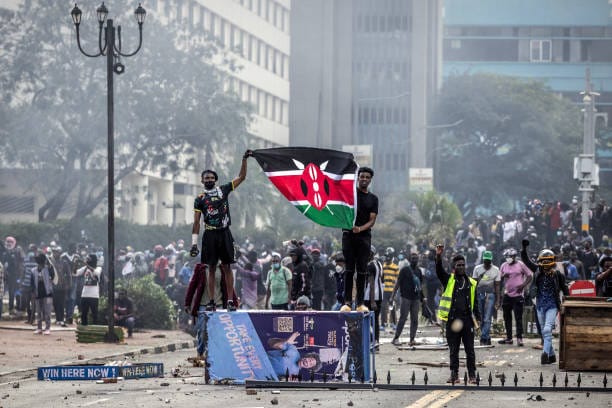In Summary
- Despite President William Ruto’s decision to put an unpopular tax bill on hold, Kenya braces for more protests in Nairobi.
- Ruto decided not to sign the 2024 finance bill after protests resulted in over 20 deaths.
- Ruto defended the tax increases as necessary to reduce Kenya’s $80 billion debt but acknowledged the public’s opposition.
- Human rights organizations condemned the violence against protesters, and the government’s response was criticized.
- Deputy President Rigathi Gachagua criticized the National Intelligence Service for not informing the president about the bill’s unpopularity.
DETAILS
NAIROBI, KENYA — Kenya is bracing for more protests in the capital, Nairobi, on Thursday, despite President William Ruto’s announcement to put an unpopular tax bill on hold. This decision follows deadly riots that erupted in response to the proposed tax increases.
Witnesses reported that police have set up roadblocks on streets leading to the presidential palace, indicating heightened security measures.
In a national address on Wednesday, Ruto defended the necessity of raising taxes on basic goods like bread and cooking oil to reduce the country’s massive debt of nearly $80 billion. However, he conceded that the public did not support the finance bill and decided not to sign it.
“I concede and therefore I will not sign the 2024 finance bill. It shall subsequently be withdrawn and that shall be our collective position,” Ruto said from the State House, addressing lawmakers.
The bill had won parliamentary approval on Tuesday, but the scene quickly descended into chaos as clashes between police and protesters intensified. Hundreds of demonstrators stormed the parliamentary complex, setting parts of it on fire.
Late Tuesday evening, President Ruto condemned the storming of parliament by protesters, calling it treasonous and a threat to national security.
On Wednesday, human rights defenders and good governance organizations gathered at the Kenya Human Rights Commission to denounce the violence against protesters and hold the president accountable for the events.
Grace Wangechi, executive director of the Independent Medico Legal Unit (IMLU), stated, “There’s absolutely nothing wrong with Kenyans getting on the streets to voice themselves. This is a constitutional provision as part of the Kenyan constitution 2010.”
Lorna Dias, a human rights defender and executive coordinator of the Gay and Lesbian Coalition of Kenya, added, “There’s nothing that justifies the use of live bullets on protesters. The destruction of property that happened on the streets was a security failure and this regime should take the blame.”
Deputy President Rigathi Gachagua, speaking from Mombasa, expressed sympathy for President Ruto but criticized the National Intelligence Service (NIS) head, Noordin Haji, for not adequately briefing the president about the bill’s unpopularity. “Had the National Intelligence Service briefed the president that this bill was unpopular with the Kenyan people, there would not have been deaths and mayhem,” Gachagua said.
There was no immediate response from the intelligence service.
Gachagua also urged protesters to call off further planned protests, suggesting that doing so would allow for “an honest conversation on how to work on our country.”
The situation remains tense as the Kenyan government navigates the aftermath of these protests and the broader implications of the finance bill’s withdrawal.
https://www.africanexponent.com/kenya-braces-for-more-protests-despite-president-ruto-withdrawing-unpopular-tax-bill/


